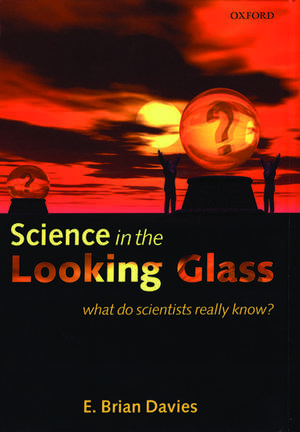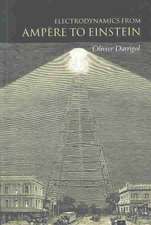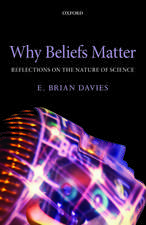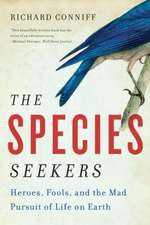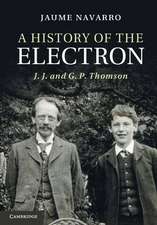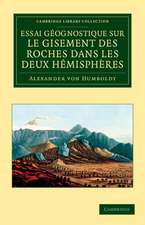Science in the Looking Glass: What do scientists really know?
Autor E. Brian Daviesen Limba Engleză Hardback – 7 aug 2003
| Toate formatele și edițiile | Preț | Express |
|---|---|---|
| Paperback (1) | 254.67 lei 31-37 zile | |
| OUP OXFORD – 28 iun 2007 | 254.67 lei 31-37 zile | |
| Hardback (1) | 242.63 lei 31-37 zile | |
| OUP OXFORD – 7 aug 2003 | 242.63 lei 31-37 zile |
Preț: 242.63 lei
Preț vechi: 296.74 lei
-18% Nou
Puncte Express: 364
Preț estimativ în valută:
46.43€ • 50.42$ • 39.00£
46.43€ • 50.42$ • 39.00£
Carte tipărită la comandă
Livrare economică 11-17 aprilie
Preluare comenzi: 021 569.72.76
Specificații
ISBN-13: 9780198525431
ISBN-10: 0198525435
Pagini: 308
Ilustrații: 29 b/w line figs; 8 b/w halftone figs
Dimensiuni: 161 x 242 x 21 mm
Greutate: 0.72 kg
Editura: OUP OXFORD
Colecția OUP Oxford
Locul publicării:Oxford, United Kingdom
ISBN-10: 0198525435
Pagini: 308
Ilustrații: 29 b/w line figs; 8 b/w halftone figs
Dimensiuni: 161 x 242 x 21 mm
Greutate: 0.72 kg
Editura: OUP OXFORD
Colecția OUP Oxford
Locul publicării:Oxford, United Kingdom
Recenzii
...it is a brilliant work, beautifully written, and brimming with surprising information and stimulating philosophical speculations. Notices of the AMS, December 2005, Volume 52, Number 11.
... the leading mathematician E. Brian Davies is a refreshingly dissident voice ... One of the most impressive aspects of Davies' treatment is its breadth - he covers both the physical and life sciences and touches on philosophy ... those who read the book will find much to set them thinking, especially about the blind worship of mathematics that is often taken for granted in popular science books.
... all professionals are sure to learn something new ... I feel justified in commending this well-written book to the readership of Materials Today ... This will not help the reader to design a spintronic device, improved magnetic memory, or photonic 'crystal', but will reassure that, as a scientist in the 21st century, he or she is heir to an enormously varied and honorable tradition. Looking backwards contentedly leads to looking forward hopefully.
Science in the Looking Glass is worth reading in your leisure time. It is stimulating even when you disagree with the author.
Davies writes in an accessible, non-technical style. He favours concrete examples and down-to-earth refutations. He is not interested in engaging in the layers of scholarship and theoretical debates that surround virtually every idea that he examines, preferring instead to carve his own uncluttered path through the issue. This allows him to move swiftly and to cover much terrain ... The result can be fresh and exhilarating.
Science in the Looking Glass is an original and superbly intelligent attempt by someone who knows and loves the subject, to challenge the misconceptions and transcendental mysteries that cling so beguilingly to mathematics.
The value of this book for a mathematician lies in a number of mathematical examples that one can use to popularize mathematics ... an interesting and fairly exciting reading.
... the leading mathematician E. Brian Davies is a refreshingly dissident voice ... One of the most impressive aspects of Davies' treatment is its breadth - he covers both the physical and life sciences and touches on philosophy ... those who read the book will find much to set them thinking, especially about the blind worship of mathematics that is often taken for granted in popular science books.
... all professionals are sure to learn something new ... I feel justified in commending this well-written book to the readership of Materials Today ... This will not help the reader to design a spintronic device, improved magnetic memory, or photonic 'crystal', but will reassure that, as a scientist in the 21st century, he or she is heir to an enormously varied and honorable tradition. Looking backwards contentedly leads to looking forward hopefully.
Science in the Looking Glass is worth reading in your leisure time. It is stimulating even when you disagree with the author.
Davies writes in an accessible, non-technical style. He favours concrete examples and down-to-earth refutations. He is not interested in engaging in the layers of scholarship and theoretical debates that surround virtually every idea that he examines, preferring instead to carve his own uncluttered path through the issue. This allows him to move swiftly and to cover much terrain ... The result can be fresh and exhilarating.
Science in the Looking Glass is an original and superbly intelligent attempt by someone who knows and loves the subject, to challenge the misconceptions and transcendental mysteries that cling so beguilingly to mathematics.
The value of this book for a mathematician lies in a number of mathematical examples that one can use to popularize mathematics ... an interesting and fairly exciting reading.
Notă biografică
E Brian Davies, Tutorial Fellow at St John's College, Oxford in 1970 and one of two editors for the Quarterly Journal of Mathematics, Oxford. Developed the theory of open quantum systems, writing a monograph on the subject, which became the standard text. Appointed to the Chair of Pure Mathematics at King's College, London in 1981 and researched heat kernels and spectral theory. Subsequently became a Fellow of the Royal Society in 1995. His monograph on heat kernels, involving several hundred publications and having applications in many parts of mathematics, is the authoritative text on the subject. Founded the London Mathematical Society Student Text Series in the 1980s, and has recently senior editor for the LMS Monographs. Has previously been a member of the National Advisory Board of the Isaac Newton Institute and sat on the Research Assessment Exercise Panel for Pure Mathematics in 2001. Published over 180 papers.
